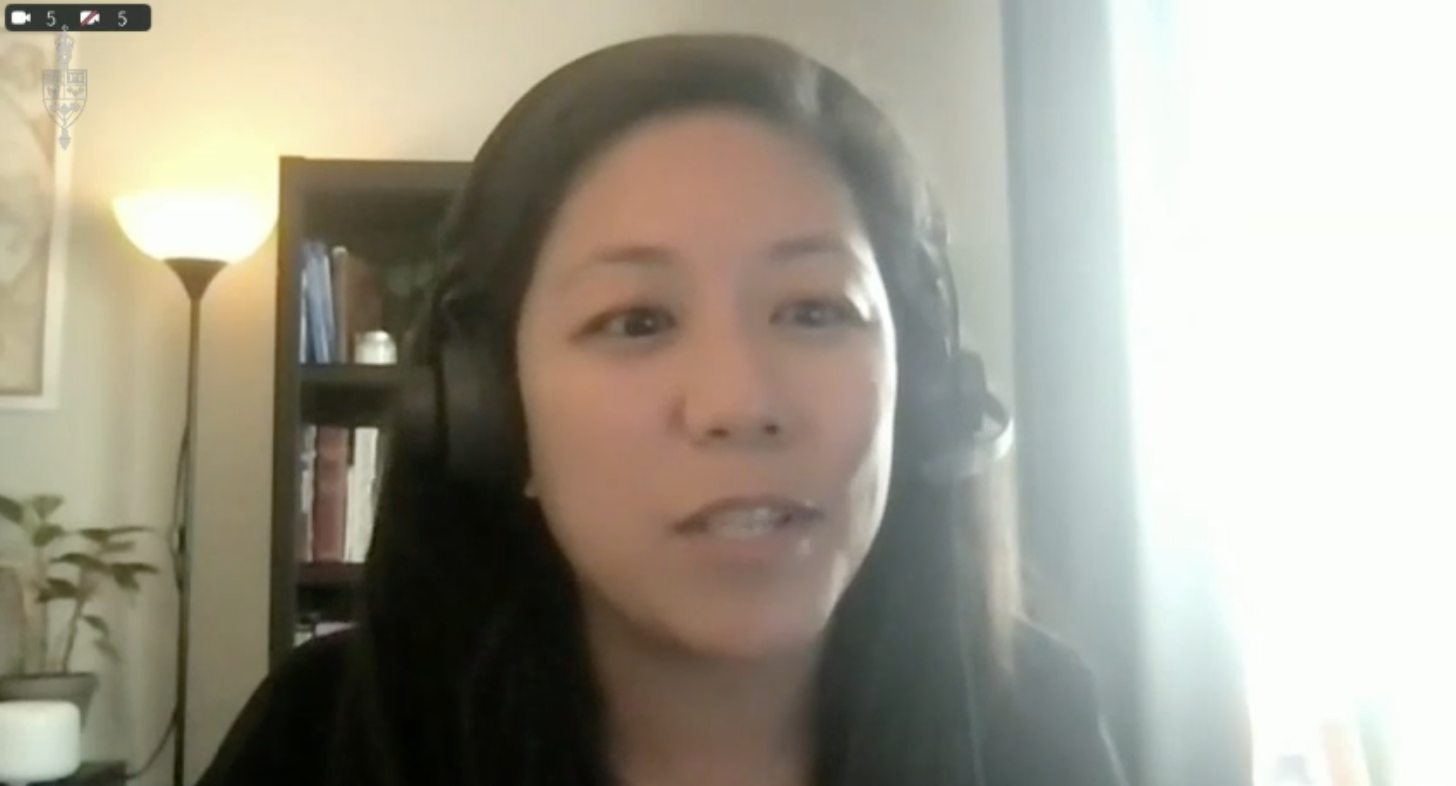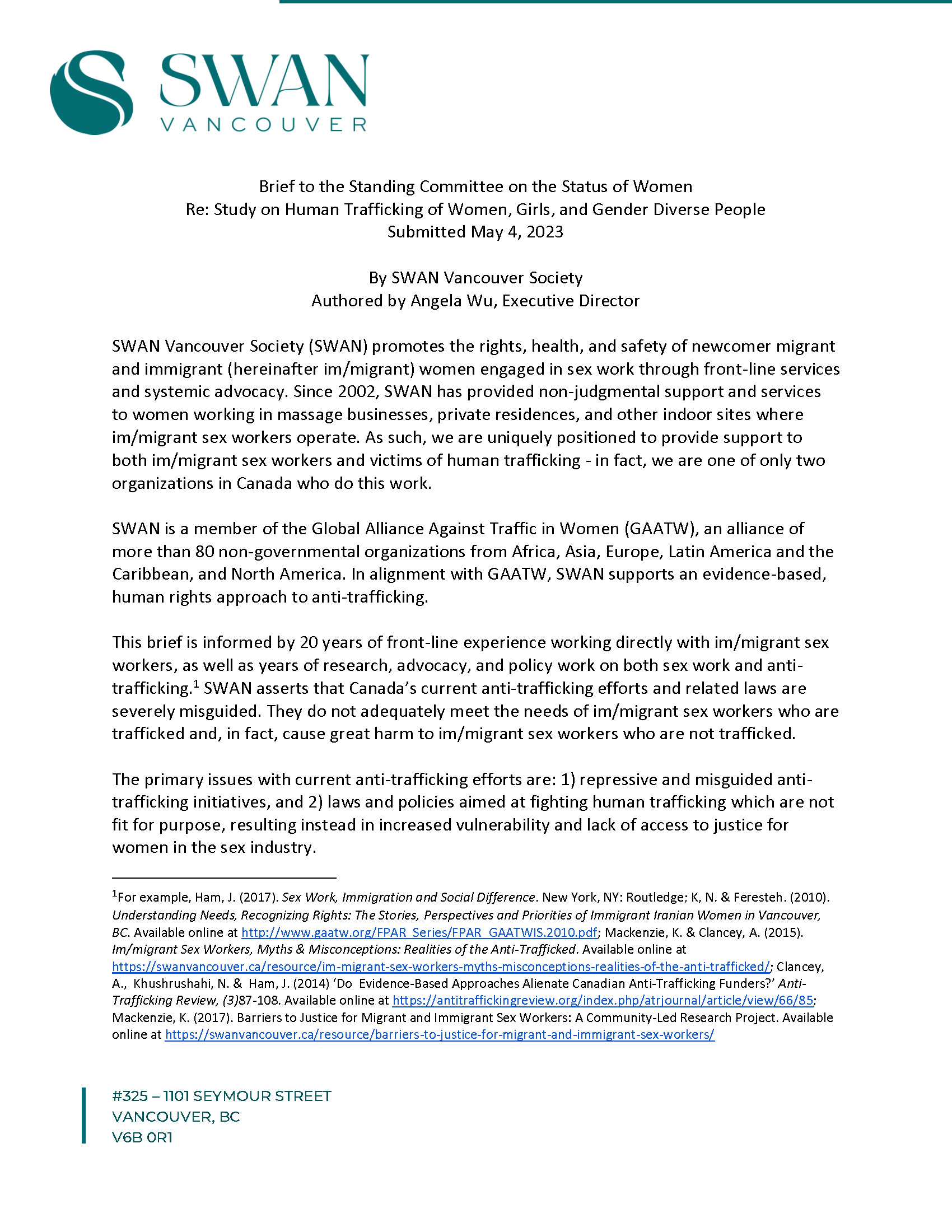On Monday May 15, 2023, SWAN Vancouver spoke to the House of Commons Standing Committee on the Status of Women for its study on human trafficking. Executive Director Angela made the following presentation:
Good morning, Committee Members.
My name is Angela Wu, and I am speaking today on behalf of the Canadian Alliance for Sex Work Law Reform. I am the Executive Director of SWAN Vancouver, a member group of the Alliance. For the past 20 years, SWAN has supported newcomer, migrant, and immigrant women engaging in indoor sex work. We work to promote the health, rights, and safety of these women through front-line services and systemic advocacy.
SWAN is also a member of the Global Alliance Against Traffic in Women, an alliance of more than 80 organizations from around the world working to end trafficking. As such, we are deeply familiar with issues relating to both sex work and trafficking. At SWAN, upholding sex workers’ rights and addressing trafficking are not mutually exclusive.
As the Committee has heard from other witnesses about the problematic conflation between trafficking and consensual sex work, I will not spend too much time on this point. All I will say is that sex work and trafficking are complex issues, and when they are presented as the same thing, the result is an over-simplification which has led to well-intentioned, but ineffective and even harmful initiatives, policies, and laws.
Sex workers are bearing the brunt of these policies and laws – particularly sex workers from marginalized and equity-seeking groups, including migrant workers, Indigenous and racialized workers, trans workers, substance-using workers, and workers living with mental health issues.
Throughout these hearings, I have noticed two recurring suggestions for improving Canada’s human trafficking response: Many witnesses have called for 1) increased training and public awareness campaigns about the realities of trafficking, and 2) more resources directed to law enforcement as a solution to this problem
While I agree that public education is important for addressing social issues and injustices, right now, most anti-trafficking initiatives perpetuate misinformation that do a disservice to both trafficking victims and other marginalized groups. Human trafficking awareness trainings continue to use vague, overbroad, and frankly, often racist ‘red flags’ or ‘indicators’ that trafficking is occurring. These ‘red flags’ can be applied to many situations that are not human trafficking, which often leads to people seeing trafficking where it isn’t, and ultimately wasting resources. Checklists designed to identify victims of human trafficking can be particularly problematic when they are developed based on assumptions and the conflation of sex work with trafficking, rather than on empirical evidence.
For example: a common ‘red flag’ is that a trafficker will limit or restrict a perceived victim’s ability to speak in public – or that someone will speak for them – when in reality, many of the women SWAN supports may not speak English and it’s normal for a lot of newcomers to have family members or support workers translate for them. Because anti-trafficking trainings with these problematic ‘red flags’ have become so widespread, even SWAN staff have been antagonistically questioned for simply translating for a woman and advocating for their choices.
Furthermore, there is the unacknowledged role and complex interplay of gender, race, ethnicity, language, and culture in establishing these ‘red flags’ – it is not always the red flag itself that indicates risk, but who the indicator is applied to. For example, when a number of non-White, and especially Asian, sex workers who speak accented English work together, this work situation can be perceived as a case of trafficking whereas the same conclusion may not be drawn from a group of White, Canadian-born sex workers.
Also embedded in most anti-trafficking initiatives is the idea that law enforcement is the solution to trafficking. However, repeatedly, women have told SWAN that they fear the police more than predators. This fear means some of the most marginalized and systemically vulnerable women do not report violence or exploitation. Our current laws and policies that are meant to address trafficking are self-contradictory. How can we expect law enforcement to protect the very same people that are criminalized by the laws they enforce?
Along with many other witnesses,I urge the Government of Canada to fully decriminalize sex work by repealing the Protection of Communities and Exploited Persons Act (PCEPA), as well as the Immigration and Refugee Protection Regulation (IRPR) provisions that prohibit migrants from engaging in sex work. The recent Standing Committee on Justice and Human Rights Report on PCEPA has already made the recommendation to repeal the IRPR ban on sex work. We urge the members of this Committee to reiterate this recommendation, and to hold the Government of Canada accountable to following through on repealing these regulations which actually put migrant women engaged in sex work in precarious and exploitative situations.
I ask the Committee to really think critically about the issue of human trafficking, and recognize that while it is absolutely important to address, we do not have to jeopardize sex workers’ lives to do so. It is not enough to just say that you understand the difference between sex work and trafficking, if the resulting response continues to be anti-sex work and put sex workers in harm’s way. If Canada’s anti-trafficking approach continues to be anti-sex work at its core, the most marginalized people in the sex industry will continue to be at grave risk of violence and exploitation.


